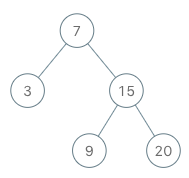Implement an iterator over a binary search tree (BST). Your iterator will be initialized with the root node of a BST.
Calling next() will return the next smallest number in the BST.
Example:

BSTIterator iterator = new BSTIterator(root); iterator.next(); // return 3 iterator.next(); // return 7 iterator.hasNext(); // return true iterator.next(); // return 9 iterator.hasNext(); // return true iterator.next(); // return 15 iterator.hasNext(); // return true iterator.next(); // return 20 iterator.hasNext(); // return false
/** * Definition for a binary tree node. * public class TreeNode { * int val; * TreeNode left; * TreeNode right; * TreeNode(int x) { val = x; } * } */ class BSTIterator { ArrayList<Integer> nodesSorted; int index; public BSTIterator(TreeNode root) { //Array containing all the nodes in the sorted order. this.nodesSorted = new ArrayList<Integer>(); //Point to the next smallest element. this.index = -1; //Call to flatten the input BST. this.inorder(root); } /** @return the next smallest number */ public int next() { return this.nodesSorted.get(++this.index); } /** @return whether we have a next smallest number */ public boolean hasNext() { return this.index + 1 < this.nodesSorted.size(); } //inorder traverse public void inorder(TreeNode root){ if(root == null){ return; } this.inorder(root.left); this.nodesSorted.add(root.val); this.inorder(root.right); } } /** * Your BSTIterator object will be instantiated and called as such: * BSTIterator obj = new BSTIterator(root); * int param_1 = obj.next(); * boolean param_2 = obj.hasNext(); */
BST:左边的总小于root,右边的总大于root
next总返回最小的,说明是inorder traverse,先用中序flatten BST到一个arraylist,然后get第一个元素即可。